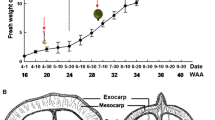Abstract.
As in many fruits, the induction of grape berry (Vitis vinifera L.) ripening results in intense breakdown of malic acid. Using membrane fractions, we tested the hypothesis that changes in acidity resulted from malate vacuolar decompartmentation. The hydrolytic activities of the two primary vacuolar pumps inorganic pyrophosphatase (V-PPase; EC 3.6.1.1) and vacuolar ATPase (V-ATPase; EC 3.6.1.3) increased throughout development with an acceleration during ripening, as confirmed by Western blotting and analysis of transcript expression. The ratio of V-PPase activity to V-ATPase activity was always in favour of V-PPase and reached its maximum value at véraison. The rate of anion transport strongly increased during ripening. Before ripening, tonoplast passive permeability was low, but rose during ripening. Our data indicate that tonoplast leakage dramatically increased during ripening. This leakage is probably the prime cause of malate decompartmentation, amplified by the incapacity of oxidative phosphorylation to face increased energy demand.
Similar content being viewed by others
Author information
Authors and Affiliations
Additional information
Received: 27 April 2000 / Accepted: 7 October 2000
Rights and permissions
About this article
Cite this article
Terrier, N., Sauvage, FX., Ageorges, A. et al. Changes in acidity and in proton transport at the tonoplast of grape berries during development. Planta 213, 20–28 (2001). https://doi.org/10.1007/s004250000472
Issue Date:
DOI: https://doi.org/10.1007/s004250000472




